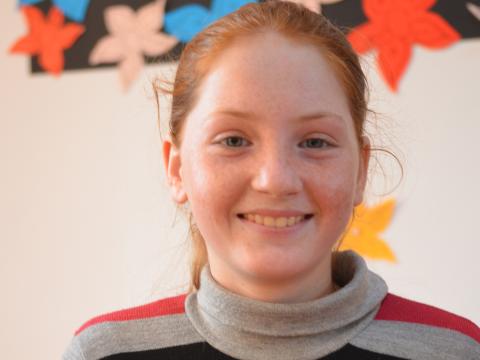“I can become a voice for my peers”: volunteerism is not a story, but something worth talking about

Sometimes we think we cannot afford to dream. But, without dreaming, every plan or intention of ever doing something, would fail from the beginning. Not just an altruistic action, volunteerism comes from the most honest belief that dreams can come true. Volunteerism promotes good intentions and improves the life of those who are less fortunate. It is a selfless act that disregards the financial or materialistic compensation and can only be fuelled by passion.
Children can become a voice for their peers when they witness the active and volunteering participation of adults from their communities. People like Mrs. Doinița Amariei, a school librarian and geography teacher in Rebricea commune.
“I have been a teacher at this school for 35 years,” she says. “I have dedicated my life to the spirit and wellbeing of this community. I look at the children I have in front of me and I think of their parents, their uncles and aunts, who have also been my pupils. I don’t think there is anyone in this village that knows everyone as well as I do,” she affirms.
Mrs Doinița is from Iaşi, but she moved Tufeştii de Jos, Rebricea commune years ago. “This is where I belong,” she says. “I have dedicated my life to the children of this community and here is where I wish to live for the rest of my life. I know that the conditions of the rural life are harsh, but I have come to identify myself with this village so much that I can’t imagine myself living outside of it.”
The “I Can Become a Voice for my Peers” project has been made possible only with the help and support of people like Mrs. Doinița - teachers, employees of the city hall and parents from the community. Guided and supported by World Vision, the community members have worked together to offer an alternative way for children to spend their leisure time with weekly activities such as painting, reading, watching documentaries, sports, theatre workshops, handicrafts and funny lessons from chemistry or geography.
The programme was also designed to encourage children to advocate for their rights. One way that they did that was to have a number of members from the Children’s Council participate in training sessions about communication, children’s rights, human trafficking, public speaking and project writing. Practical skills were exercised within the 4 workshops and projects were designed to address various issues both in the school and the community. As a result, the children wrote and presented seven projects to their teachers and school director and addressed to World Vision for funding. After being analysed and approved by community members and World Vision staff, all the initiatives designed by the children were implemented with teachers’ support.
“For me, the club is more than just a place where we can have fun and do interesting activities in our leisure time,” says Andreea Teodora, 13. “It is the place where I learned how to work with my colleagues and create something beautiful for all the children from inside the school.”
Andreea won the “Best Project Award” – a small internal competition designed to encourage children to give their best to the projects they coordinated. After working in groups of four, members of the children’s council were challenged to work individually and come up with their own ideas. They were asked to consult their friends, classmates, neighbours and teachers and develop a project based on one issue/need that children from their community have.
“I noticed that my colleagues did not attend the school library as often as they should have,” notes Andreea. “I understood that their lack of interest in reading was caused by the fact that our school does not have new and interesting books. The ones that we have are old and ruff, with missing pages. I wanted to change that and to make children [want to] read more often.”
Andrea’s project idea was called, “A book for everyone”. First and foremost, her project aimed at making small children enjoy reading and helping them discover the pleasure of learning new things by having Children’s Council members read stories, poems or tales. Secondly, Children’s Council members presented and talked about their favourite books to children from the school, during several informal meetings. Thirdly, children from the community had the opportunity to write their own book for a contest that aimed at encouraging passion for literature and creative writing. Finally, additional books for the school library have been purchased to facilitate student’s access to reading.
During a reflection discussion with Andreea and some of the children directly involved in the project activities they noted the impacts they had seen/felt as a result of the project. “I felt good seeing the happiness of the small children,” says Andreea.
Andrea confessed that she could not have succeeded with the project if it weren’t for Mrs. Doinița, who guided her steps and taught her about the importance of bringing people together. The after school activities for the 20 targeted children continued this year too and positive signs of progress were identified after discussing with teachers and parents about the children’s progress. Their attitude towards school improved, they are more responsible with their school work and integrated better in the school environment.
